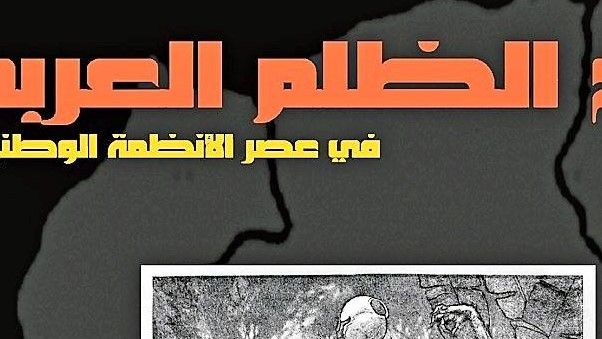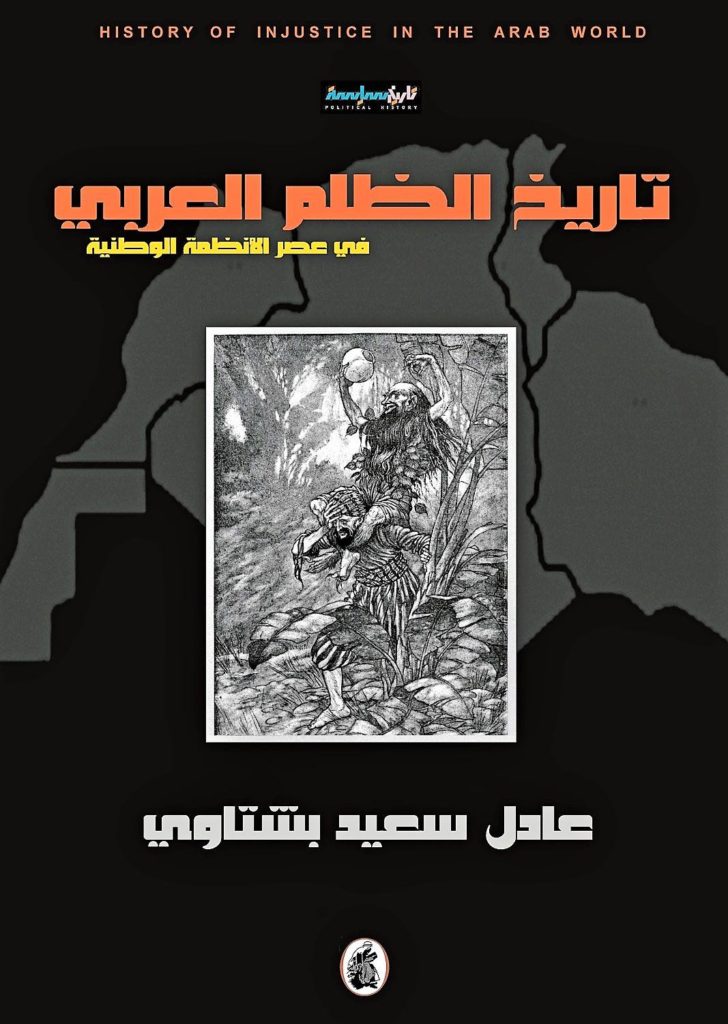
𝗛𝗜𝗦𝗧𝗢𝗥𝗬 𝗕𝗬 𝗔𝗗𝗘𝗟 𝗕𝗜𝗦𝗛𝗧𝗔𝗪𝗜
Editorial Review
“What are the chances of the Arab Nation wrestling control of its destiny from the three main powers locking horns in the region to usurp the wealth and future of the Arab World: The Arab dictatorial regimes, Bush’s America and the militants”?
“Never been greater in the past 100 years,” A. S. Bishtawi, author of History of Injustice in the Arab world, said in answer to journalists during the launch of his new book at the Sharjah International Book fair. “Through his totally unexpected moral, political and military failure in Iraq, US President George W. Bush did not just fail to uphold the high moral standards of the founding fathers of the United States of America but also all Arab dictatorial rulers who betted on a quick victory and provided him with all the support they could muster despite the opposition of the populace to the invasion and occupation of Iraq”, he said.
“Instead of forcing Iraqis to give him a free hand in moulding Iraq as the hearts of the Likud and the Neo-Cons desired, his endless misjudgements and considerable losses suffered in that Arab country in the past 20 months freed Iraqis of their fear of the might of the US”, Bishtawi said. “Soon afterwards other Arabs were liberated by the Iraqis of their fear of the US and subsequently of their fear of Arab dictators who have been tormenting them for the last 60 years with considerable help and support from the West, particularly the US.”
“These dictators are the Berlin Wall of the Arab World”, Bishtawi said. “And like the German wall, they will come crashing down because the pillars of US foreign policy that provided them with support since the mid-1950s came crashing down in Iraq. President Bush may recover his sagging popularity at home; he may have to pay the price for causing the death of 100,000 innocent Iraqis but then again he may not. The greatest price of his failure will be paid by the Arab dictators who opened their borders to the invading armies of the US and Great Britain to wreak havoc in another Arab and Muslim country. That price is likely to be their extinction within the next 5 years”.
“The removal of US troops occupying Iraq will accelerate the already fading US influence in the region”, Bishtawi believes. “One significant development was the easy removal last August of Mauritanian president Moawiah Wild Al Taia, Bush’s most loyal petty dictator in the Middle East, and the subsequent failure of the US Administration to reinstate him”.
“President Bush’s other great friend, the Egyptian President Hosni Mubarak, has demonstrated during the November/December parliamentary elections the type of brutality not seen in Egypt since the early 1950s by the then occupation forces of Great Britain. Government thugs armed with swords and daggers attacked democracy activists and thousands of police in full riot gear prevented voters from casting their ballots. If the World had any doubts that Mubarak is running a police state, the shocking violence in Alexandria and several other major cities worked to dispel them”.
Bishtawi explained that the brutality of Mubarak’s thugs may have succeeded in silencing the opposition had it not been for the almost miraculous ability of Iraqis, and later other Arabs, to liberate themselves from fear.
“Chapter 8 is largely dedicated to dissect the fear factor in the Arab World”, Bishtawi said. “It is fear that Arab regimes have used extensively to subdue the populace, and it is fear President Bush employed excessively to try to subdue Iraq. More fear and desperate acts of state terrorism may be used in the near future as a last resort to remain in power”.
“There is a psychological fact of vital importance Arabs must pay attention to: A frightened government is incapable of frightening its people. Arabs after 30 months of the sole superpower engaged in a futile attempt to pacify a devastated Iraq are neither afraid of the US nor of Israel and their own governments. The opposite may be argued to be true. This is one reason why Egyptians say the situation will never be the same in the country. Almost suddenly they realize Mubarak is fighting for his very survival and that of his ruling clan and there is no power on earth that can instil the same fear in a liberated heart.”
“We were conned by President Bush into believing he wants democracy in the Middle East but we know now he is interested in Israel and oil. Any Middle East country that proves useful in safeguarding these two most important pillars of US foreign policy in the region are friends of the US and are immune.”
“Not very long ago he talked about Iraq becoming a beacon of democracy and human rights in the Arab World”, Bishtawi said. “Thirty months of occupation have changed all that. US- occupied Iraq is an exporter of terrorism to other Arab countries, and the CIA is exporting torture to several countries in the Middle East.”

On page 16 the author writes: “American foreign policy sided with Arab dictatorial regimes against the interests of the nation so the regimes sided with the US against the interests of the people they rule. But the nation is regaining its will to deal with these interests. Therefore there is no connection between what is happening in Iraq, Lebanon, Syria, Egypt and Palestine unless we read in all of this the outcome of the Arabs’ liberation of their fear of the US. Once that was achieved, the old fear of brutal regimes has all but dissipated.”
The eventual removal of both the dictatorial regimes and US troops from Iraq is bound to deprive the majority of militants of their cause and further popular support. Many claim they are rising against both Arab and western injustice that lasted almost 100 years but the removal of foreign troops and Arab dictators will remove the major cause of the injustice. The hardened few can be easily dealt with.
“At the end justice will be done”, the author writes,” but justice is more often taken than given away. There is nothing without value, aim or price. To expel fear from their world, Arabs must first expel fear from themselves. To see light, they have to open their eyes. To march into the age of freedom, they have to leave the caves of emotion and militancy that reside in their minds. To recover their lost land, rights, dignity, security and prosperity, and to keep all these for themselves and their offspring until God inherits the Earth, they have to devise new strategies that suit our age and discard old beliefs that have exasperated the theft of their lands, rights and dignity, weakened their economy and spread injustice. Unless they do all this, Arabs will not take the correct decision and the thugs who confiscated their ability and right to make decisions will confiscate their right to make the decisions once more. A new era of injustice, both Arab and Western, will commence and only God knows when will it end.”
The writer concedes the challenges ahead are difficult and many but he has no doubt that Arabs will be able to build a superpower in the next 15-20 years. This can be achieved, he says, peacefully. “Blood spilled for freedom is no longer required in this age and dictatorial governments will suffocate by the clean air of the correct democracy heaving with hearts that had enough of Arab and Western oppression.”
But there is also a warning: “Arabs must beware of claims by their regimes that the West is their eternal enemy and they are their eternal friend. These regimes will spread this falsehood to continue their oppression…And Arabs should remember that without the help of Arab and Western governments, Iraq’s dictator Saddam Hussein would not have been able to persecute Iraq for so long, nor would Bush have been able to occupy Iraq. And without the terrorism of these regimes, some Arabs would not have known terrorism and Bush would not have come to the Arab home an invader and occupier to win the greatest prize of all: Oil. Both are one and the same, and both are afraid but Arabs should beware of sacrificing the persecuted Iraq at the alter of their hatred for Bush. They should help Iraq emerge from its crisis because the entire nation will emerge with it from its crisis”.
“The options before the nation today are not between the evil and the lesser evil; not between those who want the likes of Saddam and those who want Bush, nor between Bush’s values and injustice, or between a dormant development and backwardness. There are no real options in such vile alternatives because they will ensure the continuation of the old injustice, occupation, misery, underdevelopment but in a fresh wrapping”.
“Those who study the state of the nation will realize that the home of the largest wealth the World has ever known is home to poverty unknown in the jungles of Africa and mountains of Spanish America. And those who study the state of the nation will realize that the real development can not wait long years because the new generation is growing impatient. Tens of millions of young men and women are growing restless and they believe there are no real alternatives but confrontation. The new generation is the future and it is up to American and European leaders to decide what sort of future they will choose”.
“Not all who criticize American foreign policy are terrorists, and not all who criticize Israel are anti-Semitic and not all who criticize Arab regimes are CIA agents but we are in the age of fear and smear, and logic has no meaning. It is therefore conceivable that all those who criticize Bush are treated as terrorists or “enemy combatants”, and those who criticize Israel are branded as anti-Semitic, and those who dare criticize Arab governments are accused of being CIA agents.”
To study the state of the nation is to conclude that the hearts of most of its sons and daughters are with the Arab and Muslim Iraq but the hearts of most Arab dictators are with Bush. The fear of Bush and the fear of Arab dictators is one and the same – for Iraq to emerge victorious and for the occupation to end in defeat, for democracy to advance and injustice to retreat, for people to regain their destiny and dignity or for the regimes and their protector in Washington to keep the nation weak and humiliated.”
“Like the their ancestors on the eve of the fall of Acre in 1291,” Bishtawi concluded, “Arabs today have a choice but the ability to make a choice is not enough – it must be the correct one.”
Image caption: fron page of History of Injustice in the Arab World